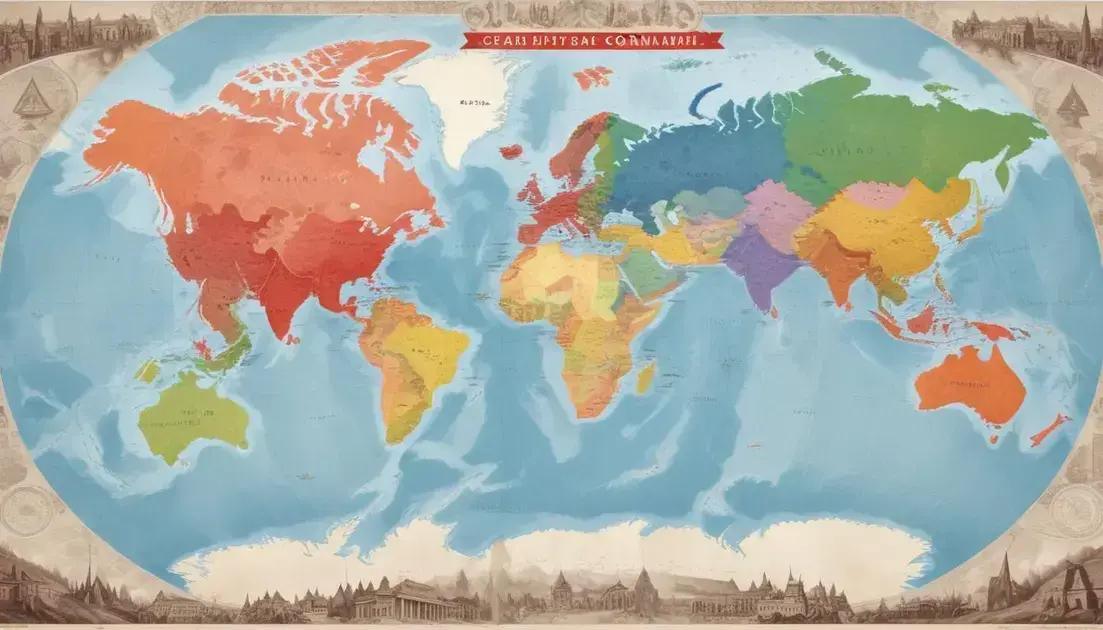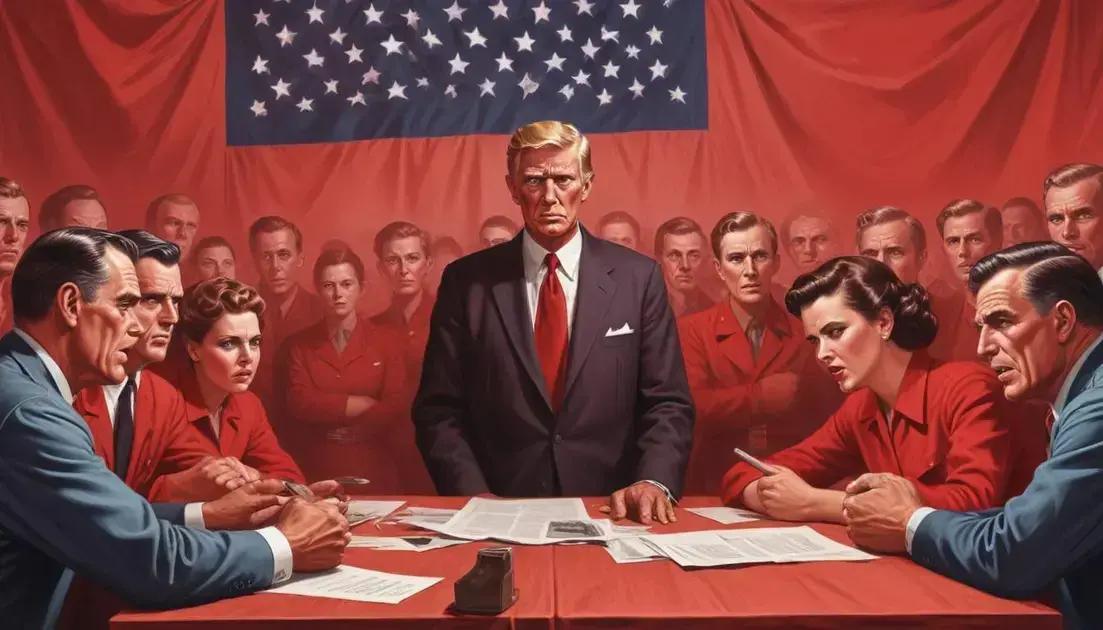
What If Communism Had Won the Cold War?
The Cold War was a significant period of geopolitical tension between the United States and the Soviet Union, shaping global alliances and ideologies. This era influenced social structures, economies, and cultures worldwide. Key events, like the Cuban Missile Crisis and the arms race, highlighted the dangers of nuclear conflict while also driving technological advancements. Lessons from this time emphasize the importance of diplomacy and open communication in preventing future conflicts and understanding the complexities of international relationships.
Ever thought about what would happen if Cold War ideologies had triumphed? Join us as we explore some fascinating possibilities!
Introduction to the Cold War
The Cold War was a long period of tension between the United States and the Soviet Union. It started after World War II and lasted for several decades. Unlike regular wars, this conflict did not involve direct fighting between these two superpowers. Instead, it was marked by political struggles, military build-ups, and intense propaganda.
During the Cold War, both sides tried to expand their influence around the world. The United States promoted capitalism and democracy, while the Soviet Union supported communism and a single-party state. This global rivalry sparked many conflicts in various countries, such as Korea, Vietnam, and Cuba.
One significant event was the Cuban Missile Crisis in 1962. This standoff brought the world close to nuclear war when Soviet missiles were discovered in Cuba, just 90 miles from the U.S. coast. The crisis ended with a deal that removed the missiles in exchange for the U.S. not invading Cuba.
Another notable aspect was the arms race. Both nations built massive stockpiles of nuclear weapons, leading to fears of a potential devastating war. Each side wanted to show that it was stronger and more powerful.
Throughout this period, both propaganda and espionage played crucial roles. Each side worked hard to influence public opinion and gather intelligence. Spies were often used to uncover secrets, showcasing the importance of information in this silent battle.
The Cold War reshaped many aspects of society. It influenced politics, culture, and science. Space exploration became a significant point of competition, leading to achievements like the moon landing in 1969. This rivalry led to advancements that we still benefit from today.
Hypothetical scenarios of a world under communism
What if the world had turned to communism as its main ideology? Imagining this can spark many thoughts. In a world run by communist ideas, nations would likely focus on equality and shared resources. This might mean no wealthy elite, as all property would belong to the community.
In this scenario, jobs could be assigned based on need rather than choice. Imagine working where the government decided your place. Would people feel more fulfilled, or would they miss the freedom of choice?
Education might change a lot, too. It could be free for everyone, and knowledge would be seen as a shared tool rather than a privilege. Access to basic needs like health care and housing would likely be guaranteed for all, reducing poverty significantly.
However, this system could also lead to strict government control. The state might surveil people to ensure compliance with communist ideals. With fewer personal freedoms, many might feel trapped. Would they resist? How would dissent manifest itself in such a world?
Internationally, alliances would shift. Some nations might rally behind communism, forming blocs, while others would fight to stop it. This could create more global tension, similar to what we saw during the actual Cold War.
These hypothetical scenarios of life under communism raise many questions. While the ideas might sound appealing, the reality could be more complex. Understanding this helps us learn about governance and the values we hold dear today.
Impacts on global geopolitics
The Cold War changed global geopolitics in significant ways. It created new alliances and rivalries that still affect us today. Countries picked sides between the U.S. and the Soviet Union, which shaped their foreign policies.
For many nations, joining either superpower meant military and economic support. For example, countries in Europe formed NATO with the U.S. to counter Soviet influence. On the other hand, the Warsaw Pact united Eastern Bloc countries under Soviet control.
These alliances weren’t just about defense. They also involved political ideologies. Many countries adopted communist ideas, leading to revolutions and upheavals. This phenomenon spread to regions like Asia and Africa, where nations sought independence from colonial powers.
Moreover, the arms race fueled tensions. Both the U.S. and the Soviet Union stockpiled nuclear weapons. This not only increased fears of a potential war but also led to proxy wars in various countries. Places like Vietnam and Afghanistan became battlegrounds for these competing ideologies.
International relations transformed during this time. Diplomacy took center stage as leaders sought ways to avoid conflict. The importance of organizations like the United Nations grew as nations focused on peacekeeping efforts.
The impacts on global geopolitics remind us of the lasting effects of ideological struggles. Many regions are still dealing with the consequences of decisions made during the Cold War era. Understanding this helps us navigate today’s complex world.
Social and economic effects
The Cold War had a huge impact on social and economic conditions around the world. Many countries experienced significant changes due to the ideological divide. Economically, nations had to choose sides. The U.S. supported capitalism, while the Soviet Union pushed for communism.
In capitalist countries, like the U.S., the focus was often on consumerism and growth. People enjoyed new technologies, such as televisions and cars. But this wealth wasn’t shared equally. Many faced inequality, leading to social tensions and movements for civil rights.
In contrast, in communist countries, the government controlled most industries. This aimed to provide for everyone equally. While education and healthcare were free, resources often became limited. Long waiting times for services and shortages of goods were common.
These systems created different social environments. In the U.S., freedom of speech and expression were valued, allowing protests and debates. In communist states, dissent was often silenced. Citizens lived under strict regulations, leading to fear and mistrust.
Culture also changed during this period. Many artists and writers were influenced by the ideologies of their countries. In the West, pop culture thrived, while in the East, art often had to follow government guidelines. This led to a rich but sometimes censored cultural landscape.
Overall, the social and economic effects of the Cold War shaped many aspects of daily life. Understanding these changes helps us see how history influenced the present.
Conclusion: Lessons from history
Learning from the past is important, especially with events like the Cold War. History teaches us valuable lessons about conflict and cooperation. For example, understanding the effects of political ideologies helps us see the risks and benefits of different systems.
The Cold War showed that rivalry can lead to significant advancements, like in technology and space exploration. Yet, it also brought fear and destruction, reminding us of the dangers of nuclear weapons. This balance between competition and caution is something we can reflect on today.
Additionally, observing how countries navigated their alliances can help us understand global politics better. The need for dialogue and diplomacy is clear. Strong communication can prevent misunderstandings and promote peace.
As we look to the future, we should remember the past’s impact on current events. Late 20th-century decisions still shape today’s world. Recognizing these lessons can help prevent the mistakes of history from repeating.
In essence, history isn’t just about dates and events. It’s about understanding what those events mean for us today. By studying the Cold War, we gain insights that guide our choices in the present and future.
Conclusion
In conclusion, the Cold War taught us many important lessons about conflict, cooperation, and the impact of ideologies. Understanding its history helps us recognize how decisions made in the past still influence our lives today. We learned that while competition can lead to advancements, it can also bring fear and division.
By reflecting on these lessons, we can work toward a more peaceful future. Importance lies in communication, dialogue, and diplomacy to prevent conflicts. History tells us that learning from past mistakes can help guide our choices going forward.
Ultimately, it’s essential to study history not just as facts or dates, but as a way to understand our world. The Cold War reminds us that our actions today shape the future, and we have the power to make better choices.


